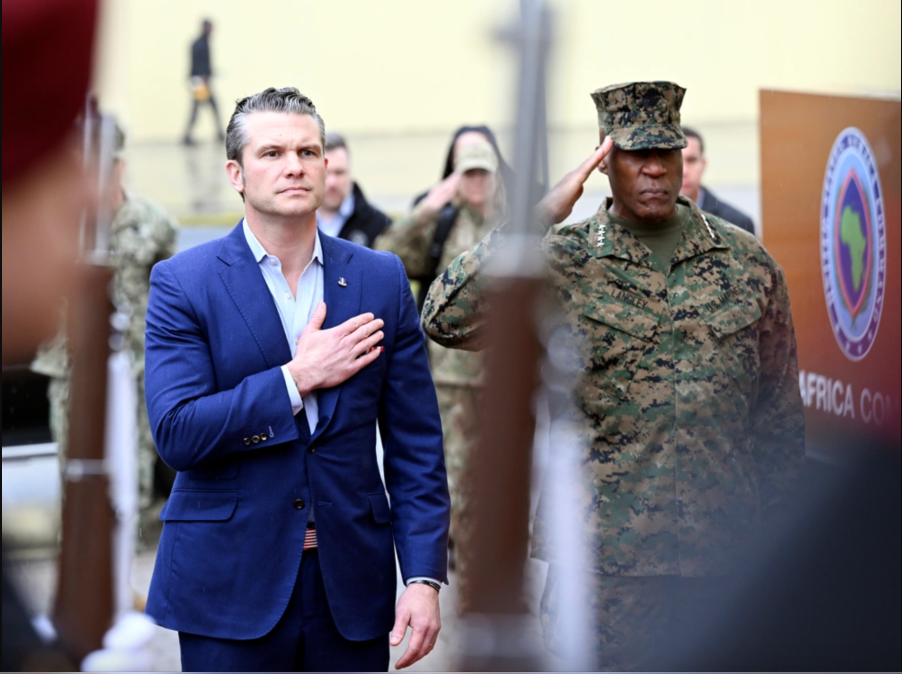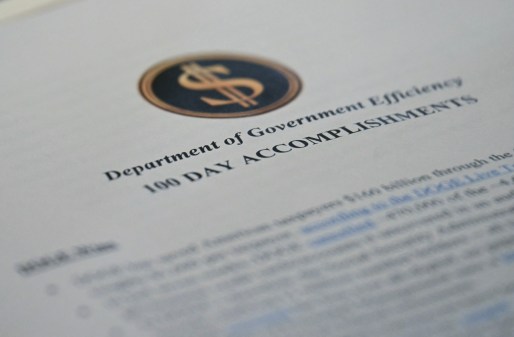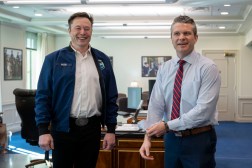Hegseth discusses DOGE plans, deterring China and more during first official trip abroad

Defense Secretary Pete Hegseth told reporters on Tuesday that he’s in close contact with Elon Musk and will soon host the tech mogul and his Department of Government Efficiency team at the Pentagon to start sorting out plans for tackling areas of bureaucratic waste and redundancy.
Briefing the media in Stuttgart, Germany, during his first official overseas trip as the Pentagon chief, Hegseth shared new details about the Trump administration’s vision for DOGE-related disruption and modernization pursuits — and how they may or may not impact military and civilian personnel in the near term.
“There’s plenty of places where we want the keen eye of DOGE, but we’ll do it in coordination. We’re not going to do things that are to the detriment of American operational or tactical capabilities,” Hegseth said.
Mirroring promises he made on the campaign trail, President Donald Trump set DOGE up the same day he was officially sworn in, Jan. 20.
An executive order formalizing its establishment stated that the organization’s purpose is “to implement the President’s DOGE Agenda, by modernizing Federal technology and software to maximize governmental efficiency and productivity.”
Trump immediately tapped Musk — a politically vocal billionaire businessman whose company SpaceX has contracted with the Pentagon and other agencies — to steer DOGE under the designation of “special government employee.”
Since its launch, the Musk-led team has attracted widespread attention for its controversial probes into federal hubs including the Treasury Department and U.S. Agency for International Development.
“USAID has got a lot of problems that I talked about with the troops — pursuing globalist agendas that don’t have a connection to ‘America First.’ That’s not the Defense Department. But we’re also not perfect either,” Hegseth told reporters on Tuesday.
He confirmed that he hopes to welcome Musk and the DOGE team to the Pentagon “very soon.”
“There are waste redundancies and headcounts in headquarters that need to be addressed. There’s just no doubt. Look at a lot of the climate programs that have been pursued at the Defense Department. [The DOD] is not in the business of climate change, solving the global thermostat. We’re in the business of deterring and winning wars,” Hegseth said. “We want to look forward to finding efficiencies, and many others [including] the way we acquire weapon systems.”
The new SecDef also responded to questions from reporters about the new administration’s strategic military aims in Africa, Europe and the Indo-Pacific.
“As far as external threats, there’s just no doubt the communist Chinese ambitions are robust. Their view of the world is quite different than ours, and whoever carries that mantle is going to set the tone for the 21st century,” he said.
Hegseth emphasized that Trump “ran on being a peace president” and therefore does not want conflict with China under his leadership.
“But being strong — peace through strength — is how you deter that. And we want to posture for that, just like we believe the Europeans alongside our support need to on the continent, as well,” he said.
“The [People’s Republic of China’s] intentions are pernicious, not just in their part of the world, but also in South America and then on the African continent. And America’s posture there, along with allies and partners, is going to matter about contesting that space. So, it certainly remains a priority,” Hegseth added.
In response to reporters’ questions regarding whether the administration is planning to reduce U.S. troops’ presence abroad any time soon, he acknowledged that there’s a broad understanding across DOD that officials are going to review force posture around the world.
However, he said there “are no plans right now in-the-making to cut anything.”
After meeting with senior military leaders from U.S. European Command and U.S. Africa Command at their joint headquarters in Germany on his first international trip as SecDef, Hegseth will head to Brussels, Belgium, to attend the NATO Defense Ministerial and the Ukraine Defense Contact Group meeting.
The defense secretary suggested that, in those engagements, he’ll push for “a rapid peace deal” to end the war between Russia and Ukraine, and urge NATO allies to each spend 5 percent of their GDP on defense (though the U.S. has not pledged to make the same percentage level of investment).
“We’re going to have straight talk with our friends. This kind of urgency of this moment requires friends talking to friends about capabilities, about leadership, about stepping up, about burden-sharing and the incentives to say, ‘The European continent deserves to be free from any aggression, but it ought be those in the neighborhood investing the most in that individual and collective defense.’ That’s common sense, as the president talks a lot about. Common sense is you defend your neighborhood, and the Americans will come alongside you in helping in that defense if and when that happens. And I believe it will,” Hegseth said.
Before concluding the weeklong trip, Hegseth is slated to meet with his counterparts in Poland, where he plans to discuss furthering bilateral defense cooperation and deterrence opportunities along NATO’s eastern flank.
“This is a very important part of the world for us. The president feels that way as well,” Hegseth told reporters.






